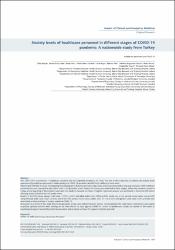| dc.contributor.author | Bayrak, Edip | |
| dc.contributor.author | Şahin, Ahmet Rıza | |
| dc.contributor.author | Avcı, Akkan | |
| dc.contributor.author | Sümbül, Hilmi Erdem | |
| dc.contributor.author | Kaya, Erhan | |
| dc.contributor.author | Kılıç, Alperen | |
| dc.contributor.author | Gürcan, Mehmet Buğrahan | |
| dc.contributor.author | Aktura, Bekir | |
| dc.contributor.author | Turgut, Celaleddin | |
| dc.contributor.author | Okyay, Ramazan Azim | |
| dc.date.accessioned | 2022-10-27T08:21:16Z | |
| dc.date.available | 2022-10-27T08:21:16Z | |
| dc.date.issued | 2022 | en_US |
| dc.identifier.citation | Bayrak, E., Şahin, A. R., Avcı, A., Sümbül, H. E., Kaya, E., Kılıç, A. ... Okyay, R. A. (2022). Anxiety levels of healthcare personnel in different stages of COVID-19 pandemic: A nationwide study from Turkey. Annals of Clinical and Analytical Medicine, 13(9), 999-1003. https://doi.org/10.4328/ACAM.21186 | en_US |
| dc.identifier.issn | 2667-663X | |
| dc.identifier.uri | https://doi.org/10.4328/ACAM.21186 | |
| dc.identifier.uri | https://hdl.handle.net/20.500.12511/9886 | |
| dc.description.abstract | Aim: SARS CoV-2 transmission in healthcare personnel was first reported on January 20, 2020. The aim of this study was to evaluate the anxiety levels experienced by healthcare personnel in Turkey during the COVID-19 pandemic and the factors affecting these levels.Material and Methods: A survey investigating sociodemographic features and examining anxiety levels was conducted among approximately 1000 healthcare personnel who were expected to take active roles in the pandemic across Turkey. The survey was conducted in three stages: before the pandemic spread to Turkey, at the beginning of the pandemic and when the pandemic became prominent. A logistic regression analysis was performed to determine the factors affecting anxiety and predictors of anxiety levels.Results: In the first survey, always (odds ratio, 15.781; p<0.01) and often (odds ratio, 5.365; p<0.05) media use, in the second survey media use (p<0.05) and profession (odds ratio, 0.021; p<0.05) and in the third survey, marital status (odds ratio, 17.716; p<0.01) and gender (odds ratio, 4.431; p<0.05) were determined as the predictors of anxiety related to COVID-19.Discussion: As a result of this study, healthcare personnel groups were defined (women, nurses, married people) who need special intervention and support to provide spiritual comfort when working on the front line in the fight against COVID-19. Further comprehensive studies are needed of the extent of psychological support required by healthcare personnel and to whom and how this support should be provided. | en_US |
| dc.language.iso | eng | en_US |
| dc.publisher | Bayrakol Medical Publisher | en_US |
| dc.rights | info:eu-repo/semantics/openAccess | en_US |
| dc.subject | COVID-19 | en_US |
| dc.subject | SARS CoV | en_US |
| dc.subject | Anxiety | en_US |
| dc.subject | Healthcare Personnel | en_US |
| dc.title | Anxiety levels of healthcare personnel in different stages of COVID-19 pandemic: A nationwide study from Turkey | en_US |
| dc.type | article | en_US |
| dc.relation.ispartof | Annals of Clinical and Analytical Medicine | en_US |
| dc.department | İstanbul Medipol Üniversitesi, Tıp Fakültesi, Dahili Tıp Bilimleri Bölümü, Ruh Sağlığı ve Hastalıkları Ana Bilim Dalı | en_US |
| dc.identifier.volume | 13 | en_US |
| dc.identifier.issue | 9 | en_US |
| dc.identifier.startpage | 999 | en_US |
| dc.identifier.endpage | 1003 | en_US |
| dc.relation.publicationcategory | Makale - Uluslararası Hakemli Dergi - Kurum Öğretim Elemanı | en_US |
| dc.identifier.doi | 10.4328/ACAM.21186 | en_US |
| dc.institutionauthor | Kılıç, Alperen | |
| dc.identifier.wos | 000863271700012 | en_US |


















